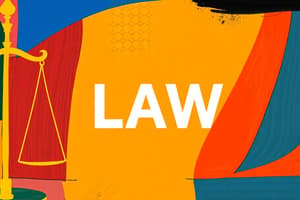Podcast
Questions and Answers
Which of the following roles does NOT directly assist a judge in legal proceedings?
Which of the following roles does NOT directly assist a judge in legal proceedings?
- Clerk
- Attorney (correct)
- Bailiff
- Expert
What is the primary function of a notary public in the context of legal services?
What is the primary function of a notary public in the context of legal services?
- To serve official acts to parties involved in a case
- To provide expert testimony in court
- To assist with real estate, matrimonial, and succession issues (correct)
- To represent defendants during a trial
In an Alternative Dispute Resolution context, which professional is primarily responsible for facilitating agreements between disputing parties?
In an Alternative Dispute Resolution context, which professional is primarily responsible for facilitating agreements between disputing parties?
- Attorney
- Bailiff
- Conciliator (correct)
- Notary public
During a criminal trial, which judge is responsible for ordering the indemnification of the victim?
During a criminal trial, which judge is responsible for ordering the indemnification of the victim?
Who typically provides opinions on technical issues during a legal proceeding?
Who typically provides opinions on technical issues during a legal proceeding?
Which type of judge is considered immovable, independent, and impartial?
Which type of judge is considered immovable, independent, and impartial?
What is the primary role of standing judges in the legal system?
What is the primary role of standing judges in the legal system?
In the case study, what law was implemented by machines to manage humans?
In the case study, what law was implemented by machines to manage humans?
Which of the following is NOT a feature of positive law mentioned in the context?
Which of the following is NOT a feature of positive law mentioned in the context?
What is the main character’s concern regarding the law passed by machines in 2155?
What is the main character’s concern regarding the law passed by machines in 2155?
Which definition of law emphasizes its role as a set of rules sanctioned by society?
Which definition of law emphasizes its role as a set of rules sanctioned by society?
Which aspect of law relates specifically to rights recognized by positive law?
Which aspect of law relates specifically to rights recognized by positive law?
What characterizes positive law in a legal context?
What characterizes positive law in a legal context?
Which of the following best describes the relationship between subjective rights and positive law?
Which of the following best describes the relationship between subjective rights and positive law?
What is a key characteristic that differentiates public law from private law?
What is a key characteristic that differentiates public law from private law?
Which example best illustrates the concept of subjective rights?
Which example best illustrates the concept of subjective rights?
In which scenario is positive law primarily focused?
In which scenario is positive law primarily focused?
How can the coercive nature of positive law be described?
How can the coercive nature of positive law be described?
Flashcards
Positive Law
Positive Law
The body of rules currently in force, generally applying to all individuals within a territory, and enforced by sanctions.
Subjective Rights
Subjective Rights
Individual or collective prerogatives ('rights') recognized by positive law.
Example of Subjective Right
Example of Subjective Right
The right to own a purchased computer.
Example of Positive Law
Example of Positive Law
Signup and view all the flashcards
Civil Law
Civil Law
Signup and view all the flashcards
Commercial Law
Commercial Law
Signup and view all the flashcards
Public Law
Public Law
Signup and view all the flashcards
Law on Majority Age
Law on Majority Age
Signup and view all the flashcards
Clerk (FR greffier) role
Clerk (FR greffier) role
Signup and view all the flashcards
Attorney's role
Attorney's role
Signup and view all the flashcards
Expert role
Expert role
Signup and view all the flashcards
Bailiff (huissier) role
Bailiff (huissier) role
Signup and view all the flashcards
Notary Public role
Notary Public role
Signup and view all the flashcards
Magistrates
Magistrates
Signup and view all the flashcards
Seated judges
Seated judges
Signup and view all the flashcards
Standing judges (Prosecutor)
Standing judges (Prosecutor)
Signup and view all the flashcards
Study Notes
Preliminary Comments: What is the Law?
- Law is defined as a body of behavioral rules dictated and sanctioned by society, imposed on members of society. (G. Cornu, Vocabulaire juridique)
- Positive law (droit positif) is the body of rules currently in force. It applies to all subjects of law within a given territory, and is subject to sanctions for non-compliance.
- Subjective rights (droits subjectifs) are the prerogatives (rights) recognized by positive law, either individually or collectively, belonging to subjects of law.
Law on Majority Age
- Majority age is part of positive law.
- Once a person reaches the age of majority, they have subjective rights such as voting, going to a club, or ordering a beer.
Types of Law
- Law is categorized into public law and private law.
- Public law includes constitutional law, environmental law, and collectivities law.
- Private law includes civil law, commercial law, consumer law, intellectual property law, company law, tax law, labor law, and criminal law.
Test Yourself #1: Question 1
- Being able to claim ownership of a purchased computer is a subjective right.
Test Yourself #1: Question 2
- Not being able to steal without fear of sanctions is part of positive law (a multiple choice question, other possible answers are available too.)
Test Yourself #1: True/False
- Rules about not smoking in Audencia halls, respecting elders, or paying alimony are part of positive law. Laws aim at reaching goals in this world not the heavens.
Case Study #1
- The year is 2155, and machines have taken over Planet Earth.
- The machines have instituted a highly technological surveillance system to prevent humans from regaining power.
- Part of this system is a law prohibiting wearing baseball caps in public places because the machines find this a good way to distinguish humans and track them.
Part I- Who Are the Actors of the Law?
- Judges/magistrates in France are divided into seated judges (magistrats du siège) and standing judges (magistrats du parquet).
- Seated judges are immovable, independent, and impartial, who apply laws, impose sanctions and make decisions. They are considered real judges.
- Standing judges decide whether or not to open a case, investigate, defend public interest, and enforce judicial decisions and conduct investigations.
Auxiliaries of Justice (Legal Professionals)
- Auxiliaries of justice include clerks (greffier), experts, conciliators, attorneys, notary public, public officers, bailiffs/hussiers. These professionals assist judges and parties in legal procedures, and/or provide support during procedures.
Test Yourself #2
- This section asks to identify whether actions in a theft scenario (reporting, arguments, sentencing and indemnification) are handled by seated judges (magistrats du siège) or standing judges (magistrats du parquet).
Studying That Suits You
Use AI to generate personalized quizzes and flashcards to suit your learning preferences.




